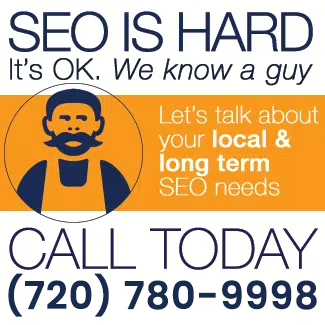Running a small business in Denver means competing with everyone else who’s figured out this city is pretty great for entrepreneurs. According to recent state data, Colorado started 48,600 new businesses just in the first quarter of 2025—that’s a 19% jump from the previous quarter. While this energy is exciting, it also means you’re fighting for attention in an increasingly crowded market.
Need help creating a website that supports your paid search campaigns? The Affordable Web Guy specializes in building small business websites that convert visitors into customers. Based in Colorado, we understand the local market and can help your business get found online.
So how do you cut through the noise? Let’s talk about paid search advertising, which isn’t the sexiest topic but happens to be one of the most reliable ways to get your business in front of people who are actually looking for what you sell.
What Makes Paid Search Different From Other Marketing

The numbers tell a pretty clear story. Businesses using paid search see conversion rates that are 50% higher than people who find them through organic search results. Plus, 65% of high-intent searches end with someone clicking on an ad rather than scrolling down to the organic results.
This isn’t about tricking anyone—it’s about being visible when someone needs exactly what you offer.
Why Denver Businesses Should Care About This Right Now
Colorado’s business landscape is shifting fast, and timing matters. 99.5% of all Colorado businesses are small businesses, employing nearly half the state’s workforce. Meanwhile, online retail sales are projected to jump 23% globally by 2027, according to the U.S. Small Business Administration.
What does this mean? Your potential customers are online, they’re searching, and they’re ready to buy. However, if you’re not visible in those search results, you’re essentially invisible to them.
How Paid Search Actually Works (Without the Jargon)
When someone searches for something on Google, an auction happens in milliseconds. Advertisers who’ve bid on relevant keywords compete for the top spots. Google picks winners based on three main factors: how much you’re willing to pay, how relevant your ad is, and how good your landing page experience is.
The beautiful part? You only pay when someone clicks on your ad. No clicks, no cost.
Recent data shows the average cost-per-click for Google Ads is $2.69, though this varies widely by industry. Legal services might pay $9.21 per click, while real estate and entertainment can get clicks for as little as $1.55.
The Real Benefits (And Why Your Competitors Are Already Doing This)
You Get Results Fast
Unlike SEO, which can take months to show results, paid search campaigns can start driving traffic within hours. Once your campaigns are approved, your ads begin appearing in search results almost immediately.
You Control Your Spending
Most small businesses spend between $100 and $10,000 per month on Google Ads. You set the budget, and you can pause or adjust campaigns anytime. There’s no long-term contract forcing you to keep spending.
You Reach People Who Are Ready to Buy
93% of marketers consider PPC “effective” or “highly effective” because it targets people at the moment they’re searching for solutions. These aren’t cold leads—they’re warm prospects who’ve already shown interest.
You Get Detailed Information About What Works
Unlike traditional advertising, paid search gives you exact data on which ads drive phone calls, which keywords bring in customers, and which times of day work best for your business.
Setting Up Paid Search That Actually Converts
Start With Clear Goals
Before you write your first ad, decide what success looks like. Do you want more phone calls? Online appointments? Store visits? Your goal determines everything else about your campaign.
Focus on Local Keywords
Since you’re targeting Denver customers, include location-specific terms in your keyword research. “Accountant” is competitive and expensive. “Accountant in Capitol Hill” or “Denver tax preparation” is more specific and often less costly.
Write Ads That Sound Human
Skip the corporate speak. Your ad should sound like how you’d actually describe your business to a neighbor. Include what makes you different, mention your location, and always include a clear next step.
Make Sure Your Landing Page Matches Your Ad
If your ad promises “same-day service,” your landing page better mention same-day service prominently. Mismatched messages kill conversions faster than anything else.
Track Everything and Adjust
The most successful campaigns evolve constantly. Monitor which keywords drive actual customers (not just clicks), test different ad copy, and adjust your bids based on what’s working.
Common Mistakes That Waste Money
Don’t target every possible keyword—start narrow and expand gradually. Don’t send all traffic to your homepage instead of relevant landing pages. And definitely don’t set up campaigns and then ignore them for months.
Also, remember that mobile devices account for 70% of search ad impressions, so make sure your landing pages load quickly on phones.
Getting Started Without Breaking the Bank
You don’t need a massive budget to test paid search. Start with $500-1000 per month to gather data and see what works. Focus on your most profitable services first, then expand to other offerings once you’ve proven the concept.
Most importantly, consider working with professionals who understand both paid search and the Denver market. Building effective campaigns takes time and expertise—something most small business owners don’t have in abundance.
For Denver small businesses, paid search isn’t just another marketing tactic. It’s a direct line to customers who are actively looking for what you sell. In a market where nearly 50,000 new businesses launched in just three months, being visible when it matters most can make all the difference.
The businesses thriving in Denver right now aren’t necessarily the ones with the best products or services—they’re the ones their customers can actually find.

